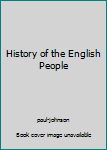History of the English People
Select Format
Select Condition 
Book Overview
A panoramic survey of 2,000 years of English history. 14 cassettes. This description may be from another edition of this product.
Format:Paperback
Language:English
ISBN:0297786237
ISBN13:9780297786238
Release Date:January 1985
Publisher:Littlehampton Book Services Ltd
Length:480 Pages
Weight:2.40 lbs.
Customer Reviews
3 ratings
Subjective, Polemical, and Magnificent
Published by Thriftbooks.com User , 17 years ago
Paul Johnson never fails to entertain and inform at the same time. Johnson's account of English history is subjective and polemical yet magnificent in scope and synthesis. For the reader who wishes to gain an insight into the broad sweep of English history from Roman times to the (nearly) present, this book is a good place to start. To be sure, the same reader will need to look elsewhere for a clarification of many issues and a deeper understanding of certain important areas which the author fails to discuss at length or leaves out almost entirely. All the same, this book is sure to whet the appetite. (It is interesting to note that this book, as one of the earliest written by Johnson, displays a tendency towards a liberal or leftist interpretation of historical events and phenomena. This inclination was modified in the author's later life, as he moved rightward on the political spectrum in old age.)
His Funniest History
Published by Thriftbooks.com User , 19 years ago
I finally found a copy of this. It was falling apart, and I could peel out each page as I read it, but it was well worth the misery! In "A History of the English People," Paul Johnson recounts the story of the English with both loving admiration and seething disdain; his people are to him "a huge force of good and evil." Most historians have their biases, but they mask them subtly and fairly successfully under the shadow of their academic-style prose; Paul Johnson, however, is so outright with his prejudices in this, his most opinionated history, that reading the book is at times almost comical. Queen Elizabeth, it seems, could do no wrong. If she directed murder, it was "against her will." She "was forced, with great reluctance" to persecute the Catholics and the Puritans, because "both groups, in the end, left her with little alternative." The Queen was a paragon of tolerance, whose greatest achievement was to establish "the religious system of England on a basis of moderation." James, on the other hand, was a "loutish savage." Indeed, Johnson is as expansive in his condemnation of the Stuarts as in his praise for Elizabeth: "Those who decry the influence of personality on history find it hard to argue away the speed, the perverse skill, and the absolute decisiveness with which the Stuarts demolished their English heritage." Johnson is a clever writer, and he manipulates language effectively. It is not the kind of wordplay one expects to encounter in a history. His descriptions are memorable: the Puritans "oozed hypocrisy,"* America "was the posthumous child of the Long Parliament." Many of the author's phrases are entertaining because they are tongue-in-cheek. Witch hunters, he tells us, were accused of seeking economic gain, "[b]ut this seems too cruel and cynical even for the English." The reason the English became such a powerful force in history was owing largely to their racism, but "[q]uite when they first took note of the fact that they were the successor-race to the Jews is impossible to determine." "It is a sad comment on human societies," Johnson writes, "that they can usually be persuaded to accept bribery as a system of government, provided the circle of corruption is wide enough." If the English are not safe from the historian's barb, we cannot hope that the Americans will be. Indeed, Johnson explodes the romantic view we American's have of our revolution, but not without a little romanticism of his own. The movement toward independence was, he writes, "an unholy alliance" between landowners and "swarming" lawyers, who united to manipulate the "Boston city mob" so that "America was born in organized violence masquerading as idealism." The "insurgents," he claims, "scalp[ed] and mutilate[d] British redcoats." He compares the American War for Independence to the Communist Revolution in Russia, in which "a small group of single-minded and ruthless men hustled along a multitude." Once the nation was independent, it proved no mor
A Phenominal Acheivement
Published by Thriftbooks.com User , 22 years ago
I'm surprised it's taken me so long to discover Paul Johnson. This brisk review of English history is not an over-intellectualized ideological rant, or the in-depth study of a tiny sliver of the English experience, but a broad, almost Spenglerian review of the English epic, and how they got to where they are today. It is filled with judgement and wisdom. This unabridged audio book is exceptionally well read by one of my all-time favorite readers, Nadia May. You're in for a treat, whether you're an Anglophile, or want a basic review of the English experience.





